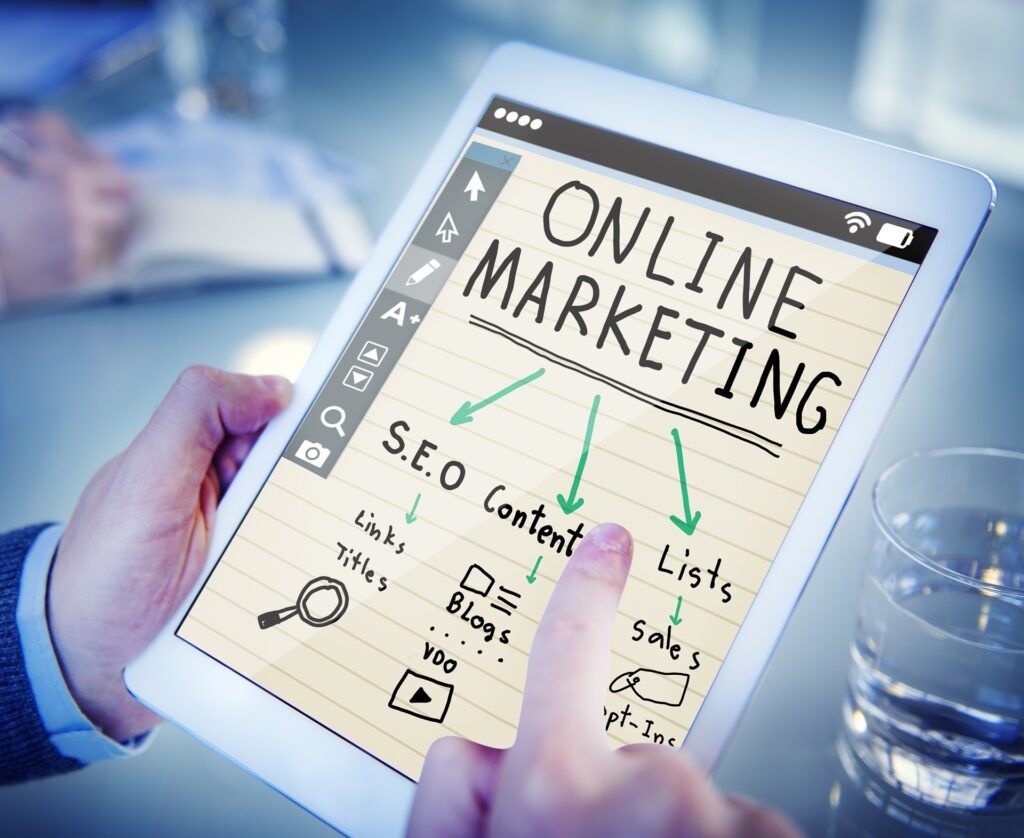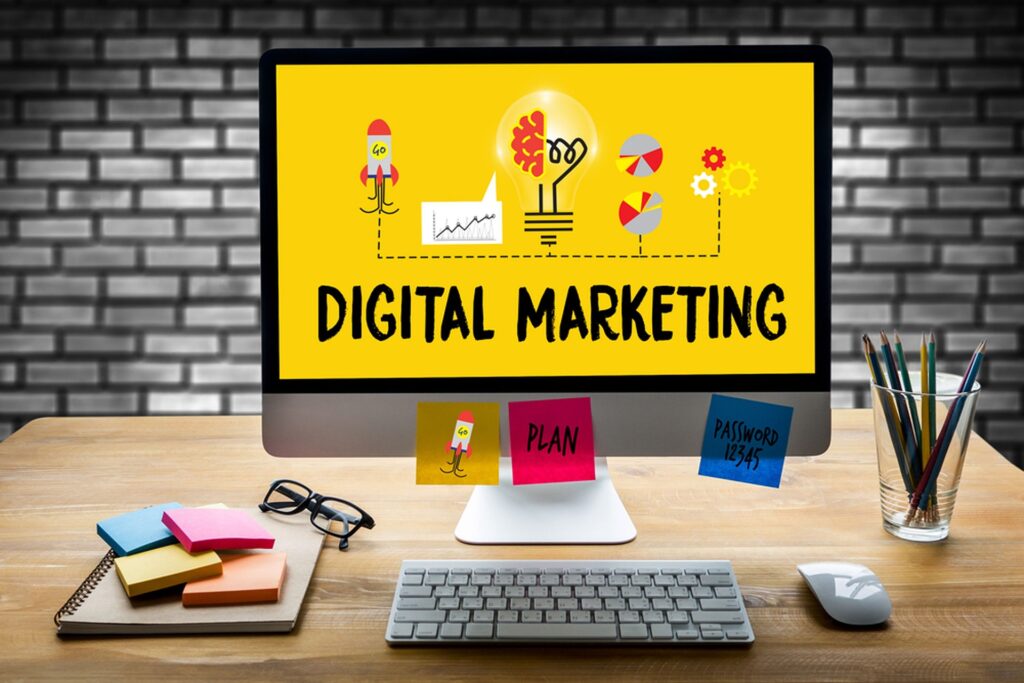

In the fast-paced digital landscape of the 21st century, digital marketing has emerged as a powerhouse, revolutionizing the way businesses connect with their audience, drive engagement, and achieve growth. From social media and search engine optimization (SEO) to email marketing and content creation, digital marketing encompasses a diverse array of strategies and tactics aimed at maximizing online visibility and driving meaningful results. In this comprehensive guide, we’ll explore the multifaceted world of digital marketing, uncovering its key components, benefits, and strategies for success.
Understanding Digital Marketing:
At its core, digital marketing refers to the use of digital channels, platforms, and technologies to promote products or services and engage with customers. Unlike traditional marketing methods, which rely on print ads, television commercials, and direct mail, digital marketing leverages the power of the internet to reach a broader audience, target specific demographics, and track campaign performance in real-time.
Key Components of Digital Marketing:
Digital marketing encompasses a wide range of components, each playing a unique role in a comprehensive marketing strategy:
Search Engine Optimization (SEO): SEO involves optimizing a website’s content, structure, and backend elements to improve its visibility and ranking on search engine results pages (SERPs).
Social Media Marketing: Social media marketing focuses on leveraging social media platforms like Facebook, Instagram, Twitter, and LinkedIn to engage with audiences, build brand awareness, and drive traffic to a website or landing page.
Content Marketing: Content marketing involves creating and distributing valuable, relevant, and consistent content to attract and retain a target audience, ultimately driving profitable customer action.
Email Marketing: Email marketing involves sending targeted, personalized emails to subscribers or customers to promote products, share valuable content, and nurture leads through the sales funnel.
Pay-Per-Click Advertising (PPC): PPC advertising allows businesses to bid on keywords and display ads on search engine results pages or other websites, paying a fee each time a user clicks on their ad.
Benefits of Digital Marketing:

Digital marketing offers a multitude of benefits for businesses looking to enhance their online presence and achieve marketing objectives, including:
Increased Visibility and Reach: With digital marketing, businesses can expand their reach beyond geographical boundaries, connecting with audiences around the globe and increasing brand visibility.
Targeted Audience Segmentation: Digital marketing allows for precise audience segmentation, enabling businesses to target specific demographics, interests, behaviors, and purchasing habits with tailored marketing messages.
Cost-Effectiveness: Compared to traditional marketing methods, digital marketing is often more cost-effective, offering a higher return on investment (ROI) for businesses with limited marketing budgets.
Real-Time Analytics and Measurement: Digital marketing provides access to real-time analytics and measurement tools, allowing businesses to track campaign performance, monitor key metrics, and make data-driven decisions to optimize their marketing efforts.
Enhanced Customer Engagement: Through digital marketing channels like social media, blogs, and email, businesses can foster meaningful relationships with their audience, engage in two-way communication, and build brand loyalty over time.
Strategies for Digital Marketing Success:

Achieving success in digital marketing requires a strategic approach and a deep understanding of audience preferences, market trends, and industry best practices. Some key strategies for digital marketing success include:
Developing a Comprehensive Strategy: Start by outlining clear objectives, identifying target audiences, and selecting the most appropriate digital marketing channels and tactics to achieve your goals.
Creating high-quality content: Content is king in digital marketing. Invest in creating valuable, relevant, and engaging content that resonates with your target audience and drives action.
Optimizing for Search Engines: Prioritize SEO efforts to improve your website’s visibility and ranking on search engine results pages, drive organic traffic, and increase brand exposure.
Engaging on Social Media: Build a strong presence on social media platforms relevant to your target audience, share compelling content, interact with followers, and leverage paid advertising to amplify your reach.
Nurturing Leads with Email Marketing: Implement email marketing campaigns to nurture leads, provide valuable content, and guide prospects through the sales funnel, ultimately converting them into customers.
Building Brand Authority:
Digital marketing provides businesses with the opportunity to establish themselves as industry leaders and experts in their field. By consistently creating and sharing valuable content, engaging with their audience on social media, and providing solutions to common problems, businesses can build trust and credibility with their target audience, ultimately establishing themselves as authorities in their niche.
Driving targeted traffic:
One of the key benefits of digital marketing is its ability to drive highly targeted traffic to a business’s website or landing pages. Through strategies such as SEO, PPC advertising, and social media marketing, businesses can attract users who are actively searching for products or services like theirs, increasing the likelihood of conversion and driving revenue.
Generating quality leads:
Digital marketing strategies such as content marketing, email marketing, and lead magnets are highly effective at generating quality leads for businesses. By offering valuable content or incentives in exchange for contact information, businesses can attract potential customers who are genuinely interested in their products or services, allowing for more targeted and personalized marketing efforts.
Improving Conversion Rates:
Digital marketing offers numerous opportunities for businesses to optimize their conversion rates and drive more sales. Through techniques such as A/B testing, conversion rate optimization (CRO), and personalized marketing campaigns, businesses can identify areas for improvement in their sales funnel and implement strategies to increase conversions and revenue.
Measuring and Analyzing Results:
One of the most significant advantages of digital marketing is its ability to provide detailed analytics and insights into campaign performance. By using tools such as Google Analytics, businesses can track key metrics such as website traffic, conversion rates, and ROI, allowing them to measure the effectiveness of their marketing strategies and make data-driven opinions for unborn juggernauts.
Adapting to Market Trends:
In the fleetingly evolving digital landscape, staying ahead of the wind is essential for business success. Digital marketing allows businesses to adapt quickly to changes in market trends, consumer behavior, and industry developments. By monitoring market trends, conducting competitor analysis, and staying informed about emerging technologies, businesses can adjust their marketing strategies accordingly, ensuring continued growth and success in the digital realm.
FAQs
1. What is digital marketing?
Digital marketing is the practice of promoting products, services, or brands using digital channels such as search engines, social media, email, websites, and mobile apps. It encompasses various strategies to engage audiences online and convert them into customers.
2. What are the main components of digital marketing?
The key components of digital marketing include:
- Search Engine Optimization (SEO): Enhancing website visibility on search engines like Google.
- Content Marketing: Creating valuable, relevant content to attract and engage an audience.
- Social Media Marketing: Using platforms like Facebook, Instagram, and Twitter to promote products and services.
- Pay-Per-Click (PPC) Advertising: Paid advertisements that appear on search engines or social media.
- Email Marketing: Sending targeted messages to a list of subscribers to nurture leads or promote offers.
- Affiliate Marketing: Partnering with other businesses or influencers to promote products.
- Influencer Marketing: Collaborating with influential people in a niche to promote a brand.
3. How does SEO improve digital marketing efforts?
Search Engine Optimization (SEO) improves a website’s visibility in search engine results. By optimizing the site’s content, keywords, and structure, SEO increases organic traffic, making it easier for potential customers to find the business. High-ranking websites gain credibility and trust, leading to better engagement and conversion rates.
4. What is the difference between SEO and PPC?
SEO involves optimizing your website for organic search engine results, which takes time but provides lasting benefits. PPC, on the other hand, is a paid form of marketing where businesses bid for ad placement in search engines or social media platforms. While PPC delivers immediate traffic, it only lasts as long as you’re paying for the ads.
5. How do social media platforms contribute to digital marketing?
Social media platforms are crucial for building brand awareness, engaging with audiences, and driving traffic to your website. Through posts, ads, stories, and live streams, businesses can create interactive experiences for their audience. Social media also allows for direct communication with customers, making it a powerful tool for customer relationship management.
6. What is content marketing and why is it important?
Content marketing involves creating and distributing valuable, relevant, and consistent content to attract and engage a specific audience. It’s important because it helps establish authority in your industry, drives traffic to your website, and nurtures leads into customers over time. High-quality content can take the form of blogs, videos, infographics, and podcasts.
7. How can businesses use email marketing effectively?
Email marketing is effective when businesses:
- Build a targeted email list with segmented audiences.
- Personalize emails to address the specific needs or interests of the audience.
- Provide valuable content, such as exclusive offers, helpful tips, or product updates.
- Use a clear call-to-action (CTA) to guide readers toward the desired outcome (e.g., making a purchase).
- Track and analyze email performance to optimize future campaigns.
8. What role do analytics play in digital marketing?
Analytics play a critical role in digital marketing by providing insights into the performance of marketing efforts. Tools like Google Analytics or social media insights help businesses track metrics such as website traffic, conversion rates, and customer behavior. These data points allow marketers to make data-driven decisions, optimize campaigns, and improve ROI (Return on Investment).
9. What is the importance of mobile optimization in digital marketing?
Mobile optimization ensures that your website and marketing campaigns are designed to perform well on mobile devices. With the majority of users accessing the internet via smartphones, a mobile-friendly site improves user experience, increases engagement, and leads to better rankings in search engine results.
10. How can businesses get started with digital marketing?
To get started with digital marketing, businesses should:
- Define clear goals (e.g., increase brand awareness, generate leads, drive sales).
- Identify target audiences and understand their online behavior.
- Build a website optimized for SEO and mobile usage.
- Choose the right mix of digital marketing strategies, such as social media, content marketing, and email marketing.
- Implement analytics to track performance and refine strategies based on data.
11. What are the challenges of digital marketing?
Some challenges of digital marketing include:
- Increasing Competition: More businesses are adopting digital marketing, making it harder to stand out.
- Keeping Up with Trends: Digital marketing strategies and platforms evolve rapidly, requiring constant learning.
- Ad Fatigue: Consumers are bombarded with ads, making it difficult to engage them effectively.
- Data Privacy Issues: New regulations like GDPR impact how businesses can collect and use customer data.
- Algorithm Changes: Platforms like Google and Facebook frequently change their algorithms, which can affect the visibility of content and ads.
12. What is the future of digital marketing?
The future of digital marketing is expected to focus on:
- Artificial Intelligence (AI): AI-driven tools will automate processes like content creation, data analysis, and customer service.
- Voice Search: With the rise of smart speakers and voice assistants, optimizing for voice search will become increasingly important.
- Personalization: Consumers expect personalized experiences, and marketers will use data to tailor messages based on user behavior.
- Video Content: Video will continue to dominate content consumption, especially with short-form videos on platforms like TikTok and Instagram.
- Sustainability and Ethics: Brands will focus on sustainability and ethical practices to align with consumer values.
Conclusion
Digital marketing is an essential component of modern business strategies, offering diverse methods to engage audiences, build brand loyalty, and drive conversions. With the increasing reliance on digital platforms, businesses must embrace digital marketing to remain competitive. By leveraging SEO, content marketing, social media, and paid advertising, brands can create highly targeted campaigns that deliver results in real-time.
One of the most significant advantages of digital marketing is its adaptability. Unlike traditional forms of marketing, digital marketing campaigns can be quickly adjusted based on performance metrics. This allows for greater flexibility and the opportunity to fine-tune strategies for maximum impact. Furthermore, with the growing importance of mobile and voice search, businesses must ensure their online presence is optimized across all devices and platforms.
As technology continues to evolve, digital marketing will remain an ever-changing landscape. Artificial Intelligence, personalization, and video marketing will be key trends shaping the future of the industry. However, despite these technological advances, the core principles of understanding your audience, creating valuable content, and building meaningful relationships will always be at the heart of successful digital marketing strategies.
In conclusion, learning the digital realm through a comprehensive understanding of digital marketing empowers businesses to reach new heights. Whether a small startup or an established enterprise, adopting effective digital marketing strategies will ensure that businesses not only survive but thrive in the digital age.
Table: Key Components of Digital Marketing
| Component | Description |
|---|---|
| SEO | Optimizing website content for search engines to improve organic search rankings. |
| Content Marketing | Creating valuable content to attract, engage, and convert audiences. |
| Social Media | Promoting products and services on platforms like Facebook, Instagram, etc. |
| PPC Advertising | Paid ads that appear on search engines and social media. |
| Email Marketing | Sending personalized emails to subscribers for nurturing and engagement. |
| Affiliate Marketing | Partnering with others to promote products/services and earn commissions. |
| Influencer Marketing | Collaborating with influencers to reach a wider audience. |
Image: The Digital Marketing Funnel
An illustration of the digital marketing funnel shows the stages from awareness to conversion. It typically starts with the awareness stage (SEO, social media) at the top, followed by consideration (content marketing, PPC), and ends with the conversion stage (email marketing, retargeting). This funnel highlights how different digital marketing strategies work together to move prospects through the buyer’s journey.











